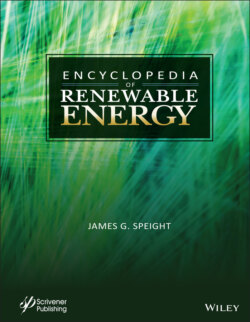Читать книгу Encyclopedia of Renewable Energy - James Speight G., James G. Speight - Страница 160
Biodiesel – Transesterification
ОглавлениеTransesterification (alcoholysis) is the conversion of triacylglycerol lipids by alcohols to alkyl esters without first isolating the free fatty acids (May, 2004). The purpose of transesterification of vegetable oils to their methyl esters (biodiesel) process is to lower the viscosity of the oil. The transesterification reaction is affected by alcohol type, molar ratio of glycerides to alcohol, type and amount of catalyst, reaction temperature, reaction time, and free fatty acids and water content of vegetable oils or animal fats. The transesterification reaction proceeds with or without a catalyst by using primary or secondary monohydric aliphatic alcohols having 1–8 carbon atoms as follows:
Generally, the reaction temperature near the boiling point of the alcohol is recommended. The reactions take place at low temperatures (approximately 65°C, 160°F) and at modest pressures (2 atm, 1 atm = 14.7 psi). Biodiesel is further purified by washing and evaporation to remove any remaining methanol. The oil (87%), alcohol (9%), and catalyst (1%) are the inputs in the production of biodiesel (86%), the main output. Pretreatment is not required if the reaction is carried out under high pressure (9,000 kPa) and high temperature (240°C, 465°F), where simultaneous esterification and transesterification take place with maximum yield obtained at temperatures ranging from 60 to 80°C (140 to 175°F) at a molar ratio of 6:1. The alcohols employed in the transesterification are generally short chain alcohols such as methanol, ethanol, propanol, and butanol. It was reported that when transesterification of soybean oil using methanol, ethanol, and butanol was performed, 96–98% of ester could be obtained after 1 hour.
